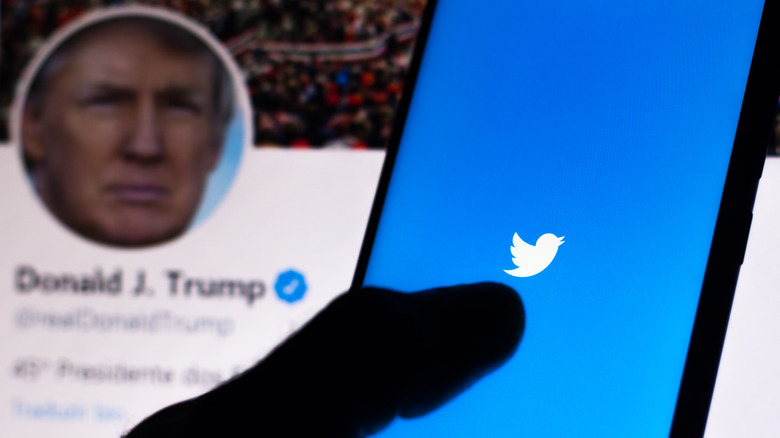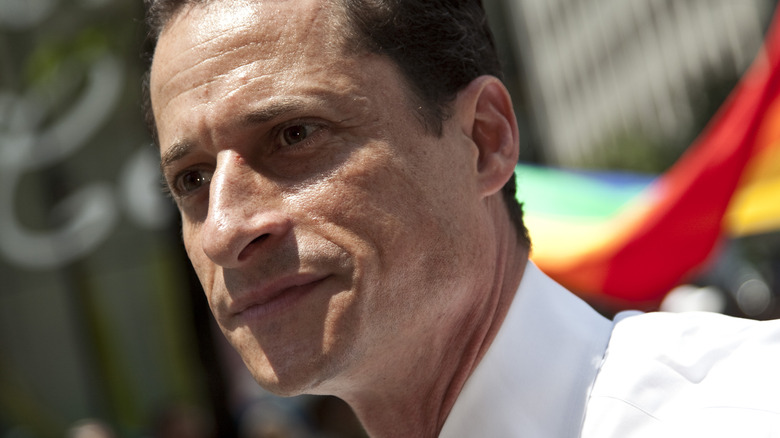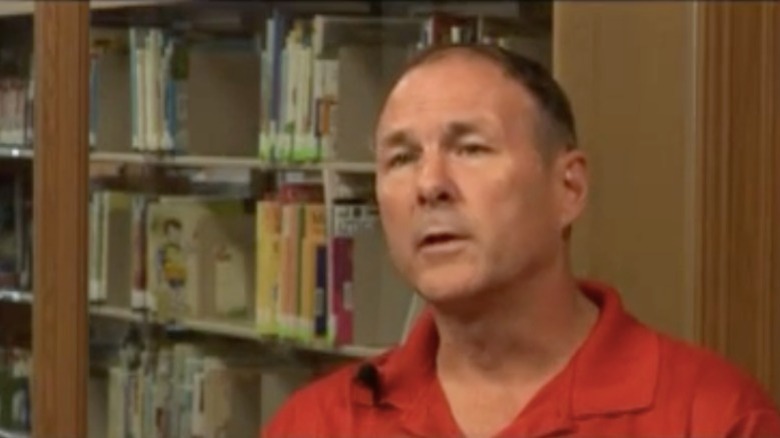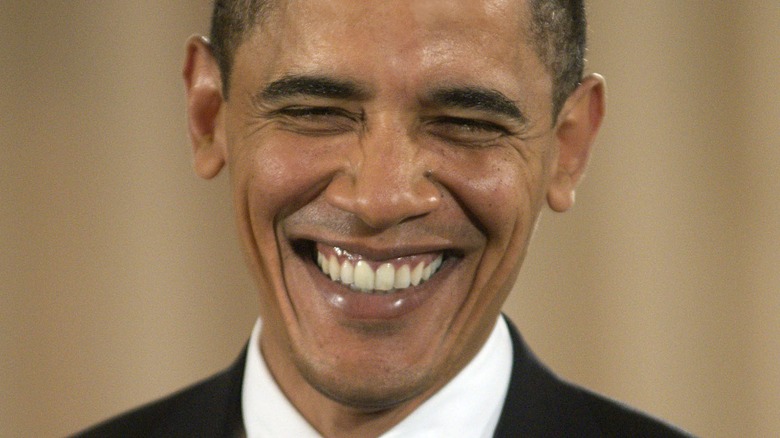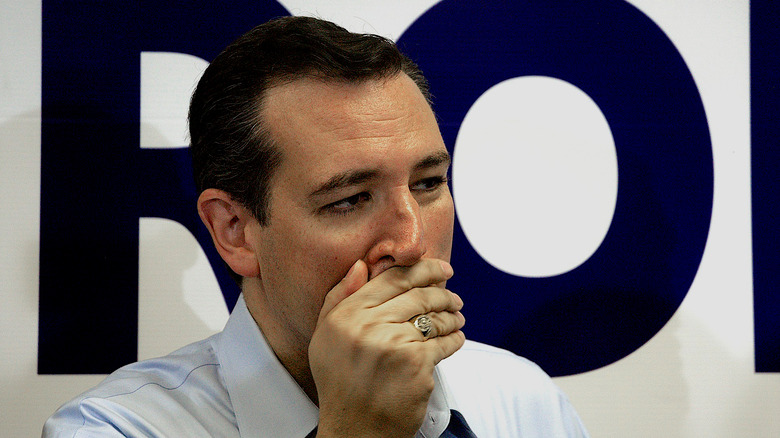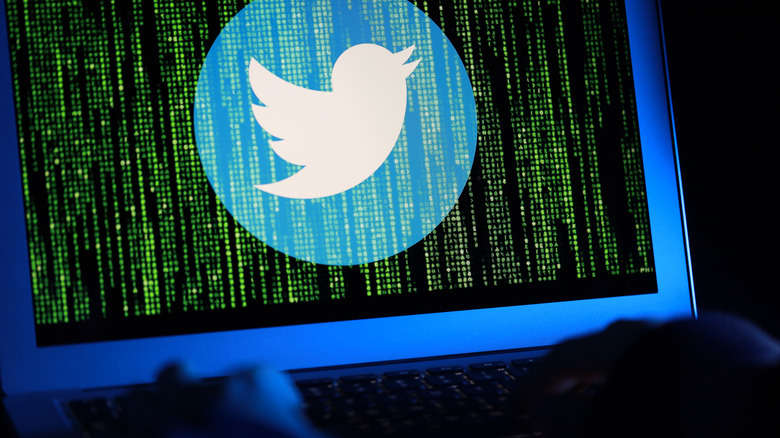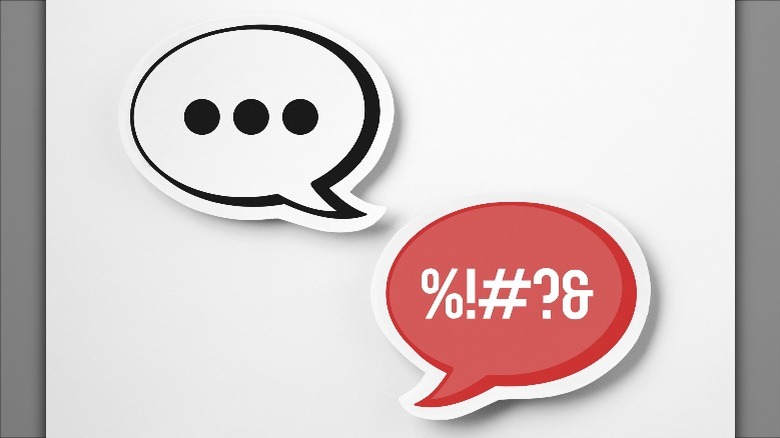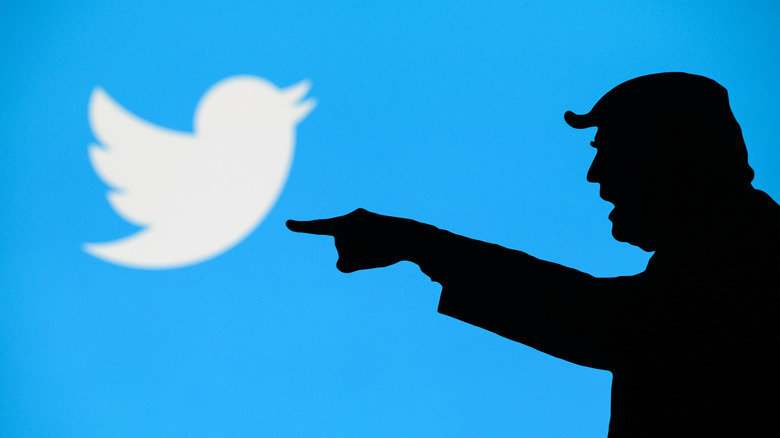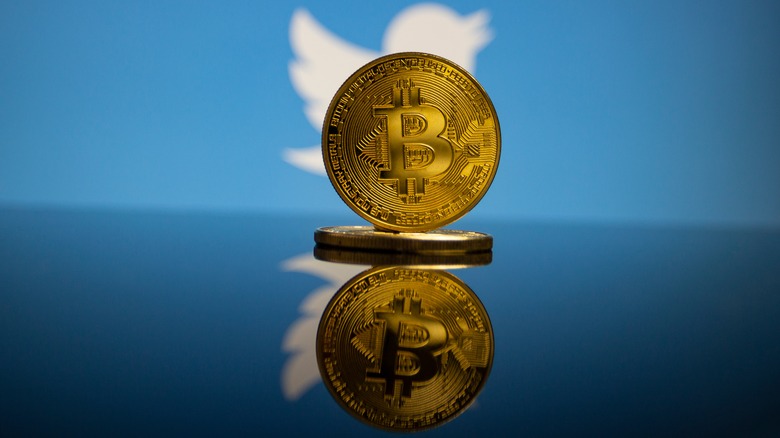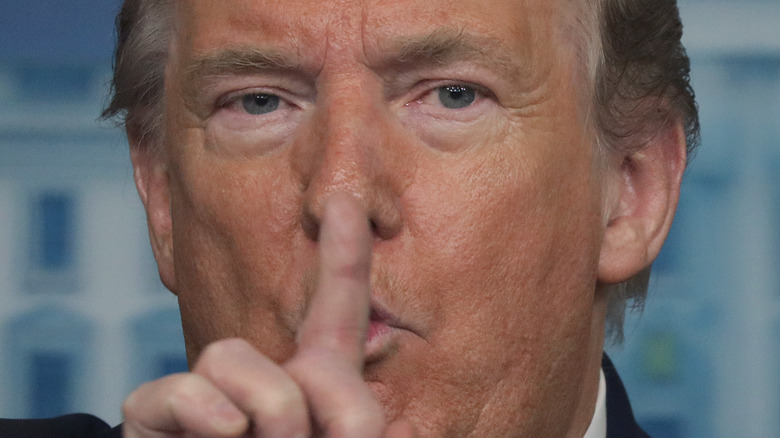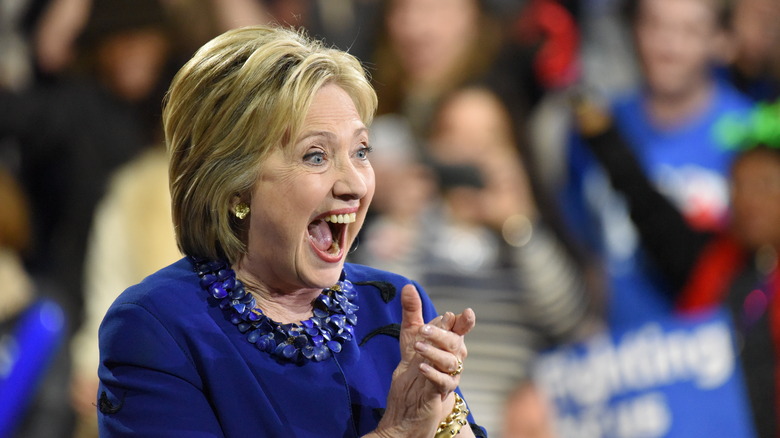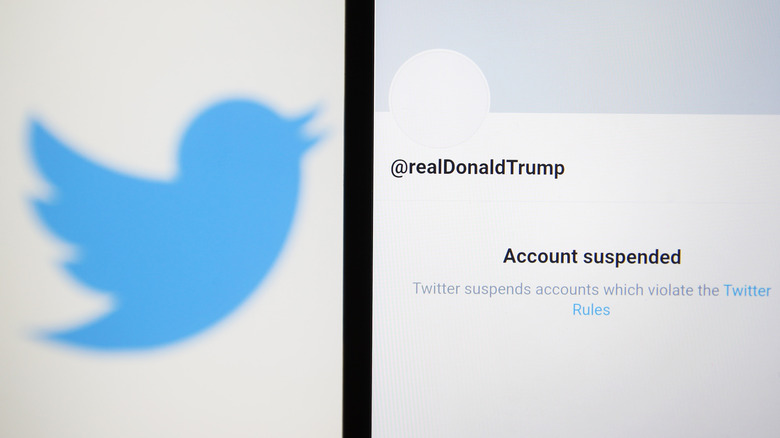Political Scandals That Unfolded On Twitter
Back in 2009, the British Conservative party leader David Cameron – who would go on to become the Prime Minister of the United Kingdom the following year – was undertaking a run-of-the-mill breakfast radio interview when he made one of the most notable gaffes of his career thus far. The radio host asked Cameron, a former PR consultant, whether he thought it was a good idea for politicians to embrace social media for the sake of campaigning and for public messaging. Cameron responded: "The trouble with Twitter, the instantness of it – too many twits might make a t***" (via The Guardian).
Dropping an obscenity live on air, Cameron inadvertently proved his own point: in the heat of the moment, even slick politicians are liable to land themselves in a whole heap of trouble. The ironic story made headlines, and Cameron later apologized for his language.
But Cameron was right. Though social media is now crucial for making our voices heard, politicians of all stripes have reason to be wary of such platforms – especially if they are prone to act on impulse. Here are some of the most notable political scandals to emerge over the years just on Twitter alone.
Anthony Weiner's rude DM
One of the most visible scandals to ever erupt on social media concerned Democratic congressman Anthony Weiner. The basics of the scandal go like this: back in 2011, Weiner, who had previously run for the mayorship of New York City in 2005, had a Twitter account with a sizeable following. Out of the blue, a 21-year-old Seattleite named Gennette Nicole Cordova received a direct message from his account containing an explicit image of a man's bulging underwear (via HuffPost).
Cordova issued a statement to the press blowing the whistle on the lewd image, while explaining she had never had any contact with Weiner previously, though she had once referred to him playfully as her "boyfriend" in a public Tweet, according to CNN. Weiner's responded by claiming to have been hacked, calling the posting of the image a "prank and not a terribly creative one." But within a week, Weiner admitted that he was responsible for the image, and later left Congress after more sexualized selfies emerged in the press.
Weiner later attempted to revive his political career, but it soon became clear that the former politician's behavior was compulsive. A further underwear selfie in which Weiner's infant son was lying near him left his wife, Huma Abedin, "furious and sickened," leading to their separation (per CNN), while the revelation that Weiner had sent yet more explicit messages, this time to a 15-year-old girl, led to him being sentenced to 21 months in prison in 2017, according to The New York Times. He served 18 months.
Dane Deutsch praising Hitler
It's probably not a great idea to signal your respect for the leader of the Third Reich when you're entering the world of politics, but that's what former U.S. Air Force captain Dane Deutsch did back in 2010, when he sent out the following bizarre Tweet: "Hitler and Lincoln were both strong leaders. Lincoln's character made him the greater leader whose legacy and leadership still lives on!" (via Twin Cities)
At the time, Deutsch was running in the general election for the Wisconsin State Senate against Democrat Robert Jauch, who had held the seat since 1986, per the same source. The Tweet, of course, caused an uproar, and Deutsch made steps to clarify his meaning: that while both men yielded great influence, Lincoln did so with a "righteous character." Deutsch's explanation did little to quell the growing criticism that now threatened to sink his campaign. Carrie Lynch, the spokeswoman of the State Senate Democratic Committee, said: "Most people think a lot more than character separate President Lincoln and Hitler ... Dane Deutsch's extreme views will turn off most voters in that area, but Twitter posts about Hitler certainly won't help his candidacy." (via the same source)
Deutsch ultimately failed in his challenge to Jauch. Per Ballotpedia, he ran once more in 2014, failed again, and has since given up running for office.
Obama calls Kanye a 'jackass'
Those of a certain age will remember the ubiquity of the incident in which Ye – or, as he was known then, Kanye West – invaded the stage at the 2009 MTV Video Music Awards and told Taylor Swift: "I'mma let you finish, but Beyoncé had one of the best videos of all time!" (via the BBC).
The incident became a viral sensation and elicited an enormous response on Twitter. But among the critiques, emotional responses and witticisms came a brief video that caused a further scandal all of its own: a short clip featuring President Barack Obama calling Ye a "jackass" (via Politico). The video was originally Tweeted by employees of ABC News, including the reporter Terry Moran, who has a sizeable following. However, per Politico, the Tweets were soon taken down; Obama's comments had been made off the record, as he was preparing for an interview with CNBC. As such, ABC News had no right to share the content and they issued an apology.
"In the process of reporting on remarks by President Obama that were made during a CNBC interview, ABC News employees prematurely tweeted a portion of those remarks that turned out to be from an off-the-record portion of the interview ... This was done before our editorial process had been completed. That was wrong. We apologize to the White House and CNBC and are taking steps to ensure that it will not happen again" (via ABS CBN). The footage is still available in various corners of the internet over a decade later.
Ted Cruz 'likes' adult content on 9/11
For politics watchers in the wider world, the name Ted Cruz first became recognizable shortly after his taking office in 2013, when the "Tea Party" favorite railed in Congress against the Obamacare medical aid package for a jaw-dropping 21 hours, in what The Guardian then described as a display of "endurance and zeal" which, rather than having any chance of a legislative victory, was performed entirely to boost his own profile.
In 2016, Cruz ran unsuccessfully for the Republican presidential nomination, losing out to Donald Trump in a hotly-worded contest, before the defeated senator endorsed the winning nominee, per the BBC. Cruz remained one of Trump's staunchest supporters throughout his presidency, right up until the 2021 United States Capitol Hill attack – which many commentators have argued Trump catalyzed through social media – after which Cruz made the claim that he "disagreed with the President's language and rhetoric for the last four years" (per CNN).
Cruz, however, ran into his own problems with social media in 2017, when it was revealed that the senator, who is married and has campaigned against the adult entertainment industry, had briefly "liked" what The Guardian describes as a "pornographic Tweet," leading to mass outrage among his mostly-conservative followers. What's worse, the incident occurred on September 11, the anniversary of the 2001 terrorist attacks on the United States. Cruz later blamed a staffer for the mistake, per The Washington Post.
2009 Twitter hack
On Thursday, December 17, 2008, users logging on to Twitter found that, rather than the usual blue bird logo, they were greeted by the image of a strange green flag, overlaid by various pieces of Farsi and Arabic text. As news of the hack hit tech news outlets and even made headlines in mainstream publications such as the New York Post, the world sought to figure out the identity of the group calling themselves the "Iranian Cyber Army."
"U.S.A. Think They Controlling And Managing Internet By Their Access, But They Don't," the hackers claimed, on the page to which Twitter.com now redirected. "We Control And Manage Internet By Our Power, So Do Not Try To Stimulation Iranian Peoples To ... NOW WHICH COUNTRY IS EMBARGO LIST? IRAN?USA? WE PUSH THEM IN EMBARGO LIST ... Take Care" (via Insider).
Seemingly an orchestrated show of resistance against Western control of the internet, investigators soon identified that the hack was the work of a Lebanese Shiite group, according to CNN, which linked the attack to the use of Twitter during Iran's general election six months earlier, when the U.S. had requested the platform delay a scheduled maintenance shutdown so that Iranians could disseminate information concerning a mass protest at a time when the mainstream media was being suppressed.
A sweary Scot's social scandal
It is no surprise that Twitter, a virtual mouthpiece through which a single person can communicate with a potential audience of millions, attracts the most opinionated among us. But having such a public sphere in which to voice your every thought can be both a blessing and a curse: especially if you're a budding politician who, unfortunately, is missing a filter.
In 2010, British politician Stuart MacLennan was running as a candidate for the center-left Labour Party in the Scottish constituency of Moray when historic abusive Tweets written by MacLennan emerged, per the BBC, including one in which he referred to old people as "coffin dodgers." Elsewhere, MacLennan targeted individuals in politics, calling the leader of the Conservative party, David Cameron, a "t***," the Liberal Democrat leader Nick Clegg a "b******," and the politically neutral Speaker of the House, John Bercow, a "t**," according to the Metro.
Soon after the Tweets came to light, Labour attempted to back their candidate, but following further opposition, they eventually withdrew his candidacy. However, Cnet notes that there was an element of self-awareness to MacLennan's ill-fated Twitter musings, in that the failed politician once commented: "[the political commentator] Iain Dale reckons the biggest gaffes will likely be made by candidates on Twitter ... What are the odds it'll be me?"
Trump's many meltdowns
No list exploring the intersection of politics and Twitter could be complete without some mention of former President Donald Trump, who for years used the platform as a means to continuously undermine Barack Obama throughout his two terms in office, most notoriously by promoting the debunked "birther" conspiracy theory, per ABC News.
And when he came to power himself, Trump's use of social media hardly abated – if anything, it grew more zealous. The President exploited the platform to smear political rivals and critics, to distract from political crises (according to The Conversation), and to manipulate facts –or, to co-opt one of his favorite terms, to spread "fake news."Trump's primary use of Twitter has been to spread propaganda and manipulate public opinion ... "He used Twitter to delegitimize information or to delegitimize the positions of his opponents," claims Sam Woolley, director for propaganda research at the University of Texas at Austin's Center for Media Engagement (per CNBC).
But despite his Machiavellian tendencies, Trump wasn't always a smooth social media operator. The divisive former reality show star had frequent online meltdowns, especially during his first impeachment trial in 2020, when he attempted to push a false counter-narrative to proceedings, Tweeting a record 142 times in one day. In June 2020, when many in the U.S. were protesting police brutality, Trump again raged online, sending exactly 200 Tweets, according to Business Insider, condemning the protesters and defending his own position, raising the question of where exactly a sitting president finds so much time to go on Twitter.
The great Bitcoin scam
What happens when some of the most trusted political accounts on Twitter suddenly make their followers an offer that seems too good to be true?
On July 15, 2020, the account of former U.S. President Barack Obama – which at the time boasted almost 120 million followers (via speakrj) – Tweeted the following: "I am giving back to my community due to Covid-19! All Bitcoin sent to my address below will be sent back doubled. If you send $1,000, I will send back $2,000! ... Only doing this for the next 30 minutes! Enjoy." (via The Wall Street Journal) The message was accompanied by a code to a cryptocurrency account.
As most commenters noted, it was a scam perpetrated by hackers who had managed to take control of Obama's Twitter account. But the shocking thing was, Obama's wasn't the only account compromised. Fellow Democrat Joe Biden – who was at the time in the middle of his presidential campaign – as well as celebrities from the world of business, such as Elon Musk and Warren Buffet, and entertainment, such as Kim Kardashian, were found to have had scam messages sent to their combined billions of followers. According to The Wall Street Journal, some 130 high-profile accounts were breached, and since then, four people have been arrested for the crime, which saw around $100,000 hit the scammers' account.
Man guesses Trump's Twitter password
But not all hacks require technical knowledge, or, really, any planning at all, as a Dutchman named Victor Gevers revealed in 2020 in one of the most laughable cyber security breaches in Twitter history.
Gevers, a cyber security researcher who describes himself as an "ethical hacker," made headlines when he revealed to the Netherlands' De Volkskrant newspaper that during Trump's re-election campaign, he had been able to gain access to the President's account simply by guessing the password, which, he claimed, was "MAGA2020!", according to The Guardian. Gevers said that Twitter had given him countless guesses before he hit upon the right phrase, adding: "I expected to be blocked after four failed attempts. Or at least would be asked to provide additional information."
Both Twitter and Trump's staff denied that any breach had occurred, with The Washington Post sharing a statement from Twitter claiming: "We proactively implemented account security measures for a designated group of high-profile, election-related Twitter accounts in the United States, including federal branches of government." However, in December 2020, a Dutch ministry confirmed that the hack had indeed taken place and that Gevers – who reported the breach immediately – would not face charges, according to The Guardian. According to Gevers, this was the second time he had managed to hack into Trump's Twitter account, with the first breach taking place during Trump's "The Apprentice" heyday some six years prior. The password then? "yourefired".
Hillary Clinton is #NotMyAbuela
Politicians of all stripes will do whatever they can if they think they can convince a previously ambivalent demographic to vote for them in an upcoming election, often with cringeworthy results. In 2015, Hillary Clinton was campaigning to become the Democratic presidential nominee, at the same time that her daughter, Chelsea, was about to give birth to Clinton's first grandchild. Always on the lookout for a PR opportunity, Clinton's team decided to wield the image of Chilton as a grandmother to help win over the crucial American Latino vote, creating a blog post, "7 ways Hillary Clinton is just like your abuela" – ("abuela is the Spanish word for "grandmother") – which they then shared on their social media channels, according to Politico.
However, Twitter's Hispanic community didn't react in the way Clinton's team might have hoped, with the hashtag #Hispandering – which has been used to label transparent attempts to win over Latino voters, according to verbal branding expert Nancy Friedman – trending in the hours after the blog post was first shared. One user shared a picture of their real abuela, Tweeting: "Dear @HillaryClinton, this is my one and only (Mexican) abuela... there's no need for #Hispandering".
Soon, the backlash provoked by the post yielded another hashtag: #NotMyAbuela, which became the top trending topic as Latino users ridiculed the Clinton team's patronizing approach, per CNet.
Donald Trump banned from Twitter
Some thought it was long overdue, while others argued that it was an unjust travesty; perhaps, however, most people knew it was inevitable. But in January 2021, the outgoing president, Donald Trump, was banned from Twitter, his social media platform of choice for almost 12 years, according to TweetBinder.
Trump's account, which by then had some 88 million followers, was permanently suspended following Tweets appearing to incite the Capitol Hill insurrection of January 6, 2021. Picking out two of Trump's final Tweets in particular, Twitter released a statement demonstrating how Trump had violated the platform's "Glorification of Violence Policy," and justifying his ban, which, per The Guardian, will remain in place even if he were to run for president again or return to the White House.
Trump has attempted to circumnavigate the ban, with the creation of a new account, @DJTDesk, which served to repost to the platform content originating on "From the Desk of Donald J. Trump," a now-defunct self-made platform that Trump launched on his own website shortly after his ban, according to the BBC. This account, too, was suspended. Trump has since taken the matter to court, claiming that his Twitter ban is unconstitutional, according to Bloomberg.
Ed Balls Day
Many look back at the early days of Twitter as a period of relative innocence, and while some of the scandals mentioned above did indeed emerge during the 2009-2011 heyday of the platform, there is one tradition that perhaps proves Twitter's nostalgic long-timers right: the enduring popularity of "Ed Balls Day."
Per The New York Times, Ed Balls is a British politician who would have remained little known outside his own country if it were not for the fact that, upon joining Twitter on April 28, 2011, he accidentally Tweeted his own name, rather than search for it, so that his first-ever Tweet – which remains online – reads simply: "Ed Balls". The date the Tweet was sent has remained in Twitter's collective consciousness ever since, but as Balls himself has noted, his name may have had something to do with the gaffe's continued visibility. "If my name was Ed Smith it wouldn't have been the same amusement in there," Balls told The New York Times.
